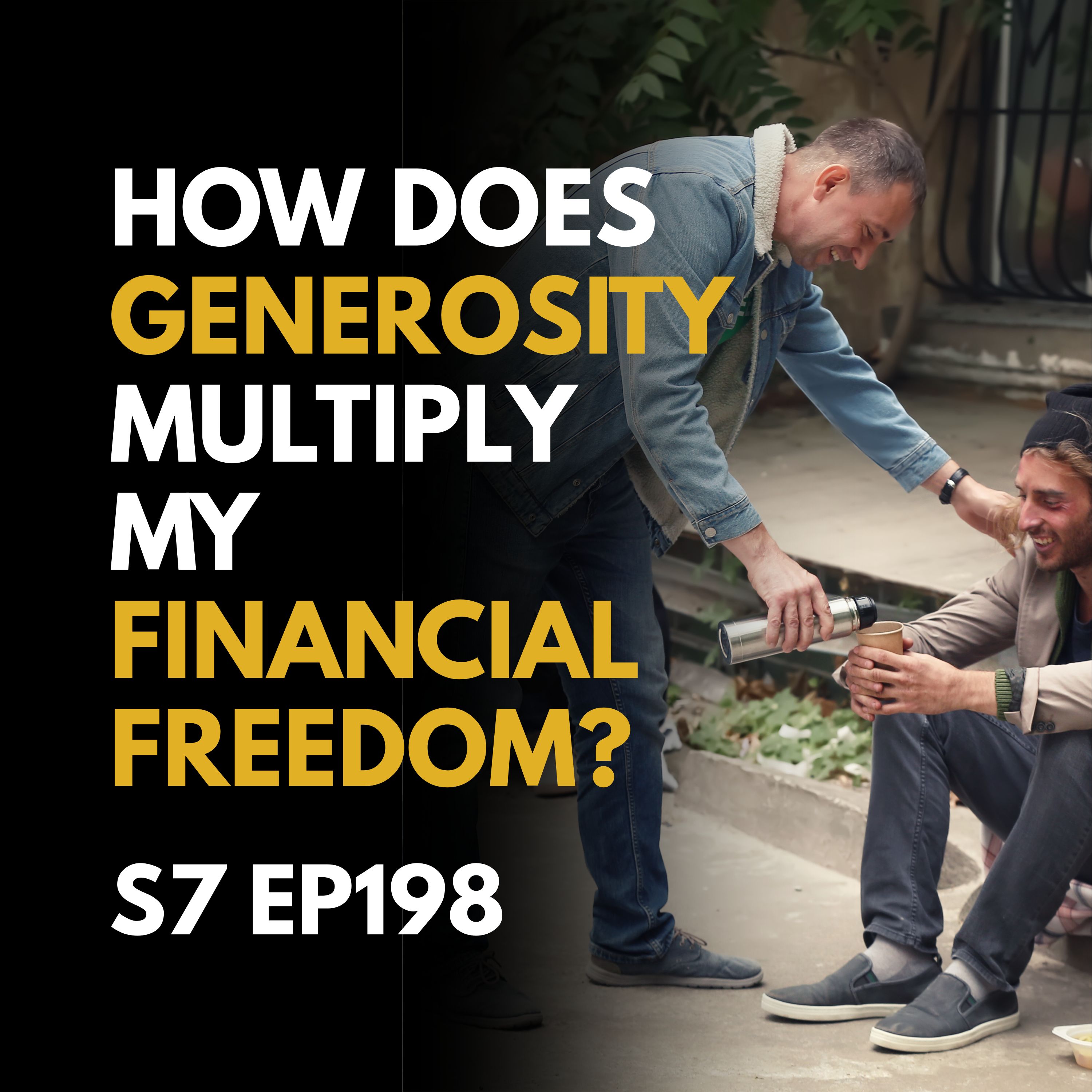Can Being Generous Lead to More Abundance?

Unlocking Abundance: How Generosity Multiplies Financial Freedom in Christ
Financial freedom is a widely sought-after aspiration, often perceived as the accumulation of sufficient wealth to live without the constraints of traditional employment. However, for those rooted in Christian faith, the path to financial freedom presents a profound, counterintuitive truth: generosity, rather than being a depletion of resources, serves as a powerful catalyst for multiplication. This exploration delves into how the practice of generosity can significantly expand financial freedom, not merely in monetary terms, but across spiritual, psychological, practical, and relational dimensions. Can Being Generous Lead to More Abundance?
Defining Financial Freedom: A Holistic Christian Perspective
Understanding financial freedom requires examining both its general and biblical interpretations, recognizing their distinct yet interconnected aspects.
General Understanding of Financial Freedom
From a broad financial standpoint, financial freedom is commonly defined as possessing adequate income, savings, and investments to support a desired lifestyle without dependence on a conventional job. It signifies having substantial control over one's finances and the choices available in life.1 This state is often differentiated from financial security. While financial security provides peace of mind regarding immediate and short-term needs—such as rent, food, and utilities—financial freedom extends beyond this basic assurance. It offers profound flexibility, enabling individuals to sustain their chosen way of life irrespective of location or how time is spent, frequently through passive income streams.2 The emphasis shifts from merely surviving to truly thriving.2 The conventional view thus centers on individual independence and control over resources to achieve personal lifestyle aspirations.
Biblical Vision of Financial Freedom
The Christian understanding of financial freedom transcends purely personal comfort and control. At its core, it means having ample resources to adequately provide for one's household and to contribute generously and joyfully to God's work.3 This perspective liberates individuals from the "love of money," fostering contentment with current possessions, and cultivating trust in God as the ultimate provider of all needs.5
This biblical vision is fundamentally built upon the principle of stewardship. It recognizes that all possessions are gifts from God, and believers are entrusted with their management for His purposes and glory, rather than for personal accumulation or self-aggrandizement.6 The divine intention behind financial freedom is to empower believers to prioritize God, remain sensitive to His guidance, and be prepared to follow His leading, ultimately channeling wealth to bless others and advance His kingdom.3
A significant implication of this Christian perspective is the reorientation of financial freedom towards a kingdom purpose. While the general understanding of financial freedom focuses on individual desires and control, the Christian framework explicitly integrates the capacity for generous giving to God's work. This is not a minor distinction but a profound reshaping of the very aim of financial well-being. If the ultimate objective of financial freedom is to serve God's kingdom, then achieving it inherently expands its impact beyond individual benefit to encompass eternal significance. This transformation in purpose means that the pursuit of financial freedom itself becomes an act of honoring God, rather than merely serving oneself.
Furthermore, the Christian definition of financial freedom involves a fundamental shift from self-sufficiency to God-sufficiency. The secular definition often implies independence from traditional employment, suggesting reliance on one's own accumulated resources.1 In contrast, the Christian understanding of financial freedom is deeply rooted in God's provision and ultimate ownership of all resources.5 This shifts the locus of reliance from personal wealth to trust in God as the ultimate source. This trust, rather than the sheer quantity of money, becomes the true liberation from anxiety and the destructive "love of money".5 This represents a deeper form of freedom, as it addresses the spiritual bondage that materialism can impose.3
The following table further illustrates these distinctions:
Category | General Perspective | Christian Perspective |
Definition | Enough income, savings, and investments to live the desired life without a traditional job.1 | Enough to provide adequately for one's household and to give generously and joyfully to God's work.3 |
Primary Goal | Personal control, flexibility, and desired lifestyle.2 | Advancing God's kingdom, blessing others, and honoring God.3 |
Source of Control | Individual's accumulated resources and financial acumen.1 | God's ultimate ownership and provision; individual as steward.11 |
Relationship with Possessions | Accumulation for personal security and future flexibility.2 | Wealth as a tool for God's purposes; freedom from the love of money.6 |
Underlying Mindset | Desire for more; potential for scarcity mindset.7 | Contentment in all circumstances; abundance mindset rooted in God's limitless resources.5 |
Table 1: Financial Freedom: General vs. Christian Perspectives |
|
|
Understanding True Generosity: More Than Just Money
Generosity in a Broad Sense
Generosity is the virtue of giving good things to others freely and abundantly. This broad definition includes money, possessions, time, attention, aid, encouragement, and emotional support. While not purely altruistic, generosity can align with enlightened self-interest. Research shows that giving benefits the giver's long-term well-being by activating the brain's reward pathways, reinforcing the desire to give. Thus, generosity is a prosocial behavior that also enhances the giver’s life, even outside a faith context.
Biblical Principles of Generosity and Stewardship
In the Bible, generosity is deeply rooted in the belief that all we possess belongs to God. Believers are stewards, not owners. Giving is seen as worship—an overflow of gratitude for God’s generosity. Scripture emphasizes giving with a cheerful heart: “God loves a cheerful giver” (2 Corinthians 9:7).
Tithing—giving 10%—has Old Testament roots (Leviticus 27:30; Proverbs 3:9) and serves as a benchmark. But biblical generosity extends beyond tithing, focusing more on the heart behind the giving. The New Testament encourages offerings and radical generosity fueled by love and grace.
More than behavior, biblical generosity reflects a believer’s identity. It's a response to God’s ultimate gift—His Son (John 3:16)—and reflects His image in us. Generosity becomes a natural expression of transformed identity, not just obligation.
Importantly, generosity is not a zero-sum game. Giving often returns long-term benefits. It’s a cycle where the act of giving enhances the giver’s well-being, even financially. This integration of altruism and self-interest presents generosity as a wise life strategy and spiritual principle.
The Multiplication Effect: How Generosity Expands Financial Freedom
A. Spiritual Harvest: The Law of Sowing and Reaping
The Bible teaches that “whoever sows sparingly will also reap sparingly, and whoever sows generously will also reap generously” (2 Corinthians 9:6). This principle applies to time, money, and resources. God is depicted as the provider who multiplies the seeds we sow (2 Corinthians 9:10), leading to “all sufficiency in all things” (2 Corinthians 9:8).
While financial blessings are part of this, God’s provision extends to wisdom, peace, relationships, and spiritual growth (Proverbs 11:24–25; Philippians 4:19). Generosity invites holistic provision—aligning with God’s nature and purpose for our lives.
B. Psychological and Emotional Rewards: Cultivating an Abundance Mindset
Acts of generosity stimulate the brain’s reward centers, releasing dopamine and creating pleasure. Studies show people feel happier when giving to others than spending on themselves. This happiness forms a positive feedback loop, increasing motivation to give.
Generosity is linked to higher life satisfaction, reduced depression, and lower stress. Focusing on others helps shift attention from personal worries, fostering a sense of purpose and control. It also cultivates gratitude and an abundance mindset, which reduces financial anxiety and boosts overall well-being—key elements of financial freedom.
C. Practical Benefits: Enhanced Discipline and Expanded Opportunities
Incorporating generosity into one’s financial plan fosters mindfulness and discipline. When people budget for giving, they tend to improve their overall money habits, including saving and spending wisely.
Generosity also expands social networks and builds goodwill, which can lead to referrals, career growth, and leadership opportunities. While giving isn’t transactional, studies link consistent generosity with greater financial stability and even income growth over time.
Charitable donations may offer tax benefits, but the true value lies in generosity’s ability to shape habits, relationships, and long-term financial health.
D. Community and Relational Wealth: Support and Reciprocity
Generosity strengthens communities by funding vital services and supporting those in need. It fosters unity, trust, and shared purpose among givers and recipients alike.
The principle of reciprocity—people returning kindness—creates networks of support. Generosity builds “social capital,” which functions as relational wealth. This mutual trust and connection serve as a financial and emotional safety net, enabling shared resilience and opportunity.
Financial well-being isn’t purely individual—it flourishes in strong, supportive communities.
Synergistic Effects: Holistic Financial Freedom Through Generosity
Generosity activates interconnected benefits across spiritual, psychological, and practical dimensions. For example:
Spiritual trust in God’s provision (Philippians 4:19) reduces financial anxiety.
Emotional peace fosters clearer decision-making and stronger financial discipline.
Practical habits, like budgeting for giving, lead to improved stewardship and opportunity.
These benefits are not isolated. They work together in a virtuous cycle. A generous life leads to stronger faith, healthier emotions, wiser finances, and deeper relationships.
Moreover, generosity can be seen as an investment—not in stocks, but in people and trust. This “social capital” often leads to opportunities and unexpected returns. Generosity reframes giving from loss to gain, offering a rich, meaningful life aligned with God’s design.
The multifaceted benefits of generosity are summarized below:
| Category | Benefits of Generosity |
| :--- | :--- | | Spiritual | Divine provision and multiplication; increased capacity for good works.29 |
| Psychological/Emotional | Increased happiness and well-being; reduced stress and anxiety; cultivation of an abundance mindset.16 |
| Practical | Enhanced financial discipline; expanded career and business opportunities; potential for higher income and long-term financial stability; tax benefits.17 |
| Relational/Community | Strengthened social networks and community bonds; reciprocal support; enhanced collective resilience.17 |
| Table 2: The Multifaceted Benefits of Generosity | | |
Navigating Misconceptions: Generosity vs. Transactional Faith
To fully understand the multiplying power of generosity, we must address a common distortion: the "prosperity gospel."
The "Give to Get" Mentality
The prosperity gospel teaches that financial giving guarantees material gain. This mindset treats God as obligated by human transactions—a distortion of Christian teaching. It misrepresents God's love and the message of Christ, which centers on self-denial and surrender, not enrichment.
This view equates wealth with blessing and poverty with failure, but Scripture warns that "the love of money is a root of all kinds of evil" (1 Timothy 6:10). True stewardship teaches contentment in both abundance and scarcity (Philippians 4:12–13), rejecting the relentless pursuit of wealth as spiritual validation.
The false promise of guaranteed material return often leads to disappointment, creating a toxic "blessing-or-failure" mindset. Hardship is then wrongly seen as a sign of weak faith, which undermines peace and trust in God's sovereignty.
In contrast, biblical generosity is often sacrificial and rooted in faith, not formula. The widow’s offering (Mark 12:41–44) illustrates that generosity flows from trust, not surplus. It’s a response to God’s character, not a transaction. Authentic giving is grounded in worship and gratitude, not manipulation. God's blessings are holistic—emotional, relational, spiritual—not just financial. True freedom is found in being free from the love of money, not free to hoard it.
Real-Life Testimonies: Stories of Generosity in Action
Both history and modern life reveal how generosity multiplies through faith, community, and trust.
Historical Examples
Barnabas (Acts 4:36–37): Sold a field and gave the proceeds to the apostles, becoming known as the “son of encouragement.”
John Wesley: Gave away all income above his basic needs. His standard of giving, not living, rose as he prospered—funding missions, churches, and orphan care.
George Müller: Ran orphanages purely by faith without asking for funds. He supported over 10,000 children and distributed hundreds of thousands of Bibles.
R.G. LeTourneau: A wealthy industrialist who gave away 90% of his income, saying, “I shovel out the money, and God shovels it back—but God has a bigger shovel.”
These figures illustrate that radical generosity—rooted in stewardship and faith—produces lasting spiritual and material impact.
Contemporary Stories
Robyn & Nicholas Sanchez: Continued to tithe despite financial strain. They sold their home for double the asking price and later received significant salary increases.
Jaymie-Leigh Herbst: Gave her last £62 during financial hardship, only to receive over £1,400 in unexpected deposits shortly after.
Small Group Support: A family facing foreclosure was rescued by their small group, who raised enough money to help them keep their home.
Anonymous Gift Cards: A struggling family received holiday groceries from an unknown giver, experiencing God’s love through the church community.
"Rags to Riches" Through Generosity: A woman lifted out of poverty by a generous couple later became a giver herself, finding purpose in helping others.
Organizational Impact: Massive gifts such as a $500,000 donation for Flint’s water crisis and institutional donations to universities illustrate generosity’s public impact.
These stories show that God’s provision often comes in surprising, relational ways—not always as direct financial returns, but always as spiritual and emotional affirmation. Generosity transforms lives, not just finances.
Practical Steps to Cultivate a Generous Life for Lasting Freedom
1. Acknowledge God’s Ownership and Practice Gratitude
Recognize that all resources belong to God (Psalm 24:1). Gratitude is the foundation of generous living and spiritual alignment.
2. Create a God-Honoring Financial Plan
Budget for Generosity First: Make giving a consistent line item, not an afterthought.
Live Within Your Means: Avoid debt and pursue contentment (Hebrews 13:5; Proverbs 22:7).
Save for the Future: Establish emergency funds and long-term savings (Proverbs 6:6–8). God blesses wise preparation (Deuteronomy 28:8).
Invest Wisely: Grow wealth with godly counsel to support long-term generosity.
Generosity, when built into financial habits, reinforces discipline and strengthens stewardship. It’s a spiritual practice with practical returns.
3. Embrace Diverse Forms of Generosity
Generosity includes time, talent, attention, and care—not just money (Romans 12:6–8).
Volunteer or mentor.
Encourage others.
Offer practical help.
Give joyfully and in proportion to your capacity (2 Corinthians 9:7; 8:11). The heart matters more than the amount.
4. Seek Wisdom and Accountability
Pray for a generous heart and surround yourself with wise, godly counsel. Spiritual and community accountability helps sustain intentional giving.
Multiplication Through Consistency
Multiplication is often the result of consistency. Planned, regular generosity creates compounding effects—much like financial investments. Small, steady acts produce long-term rewards, from deeper relationships to increased opportunities and peace of mind. This “compounding generosity” reinforces trust in God, maturity in financial behavior, and long-term transformation.
Conclusion: Embracing a Life of Open-Handed Abundance
Generosity is not a drain—it’s a divine strategy. It multiplies spiritual, emotional, practical, and communal freedom. True financial freedom is not just about accumulation; it’s about living open-handed, with confidence in God’s provision.
By embracing the biblical law of sowing and reaping, cultivating generosity in every form, and rejecting transactional faith, we enter a life of peace, purpose, and abundance. We become conduits of God’s blessings—freely receiving and freely giving. This is the path to authentic, sustainable financial freedom in Christ.












